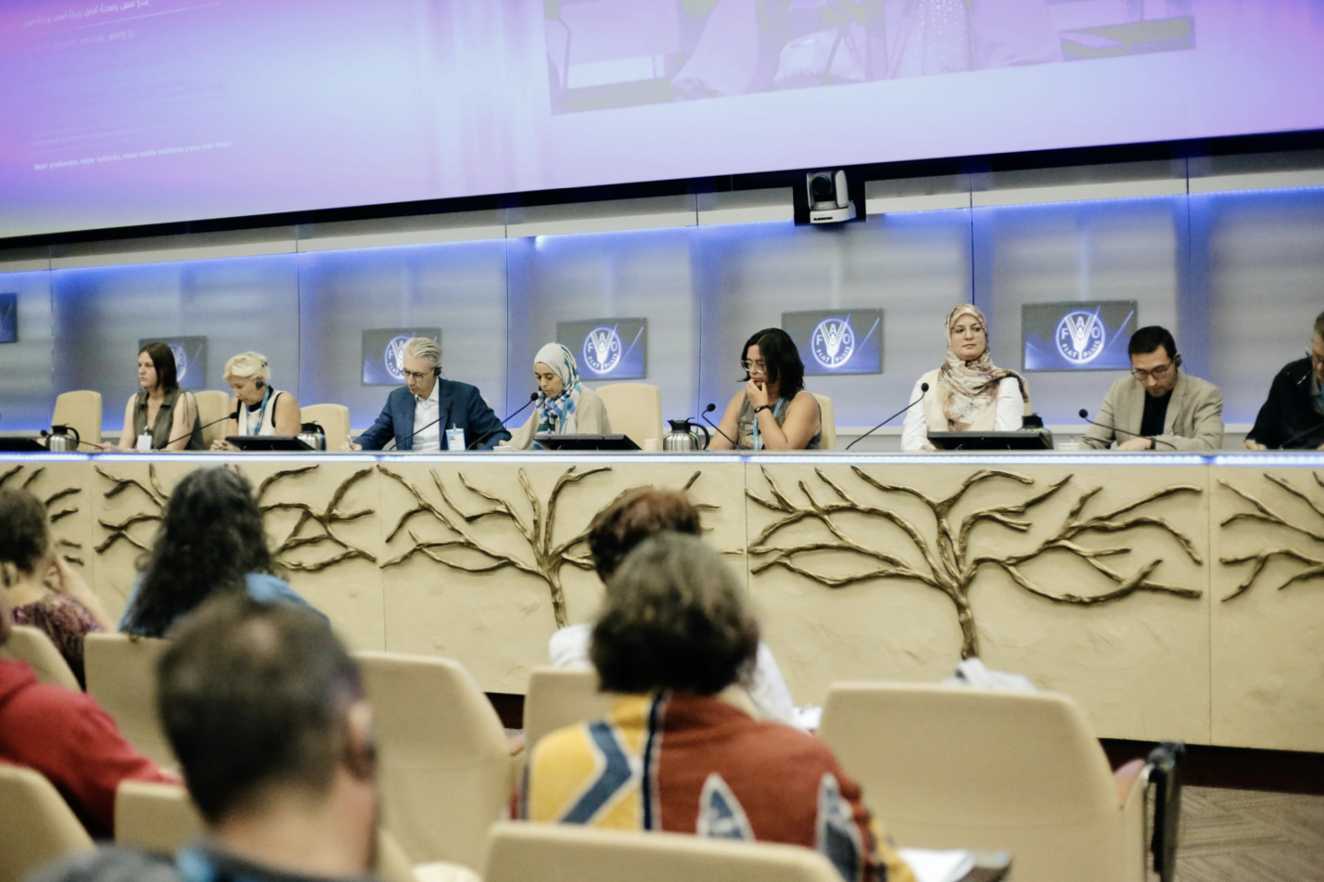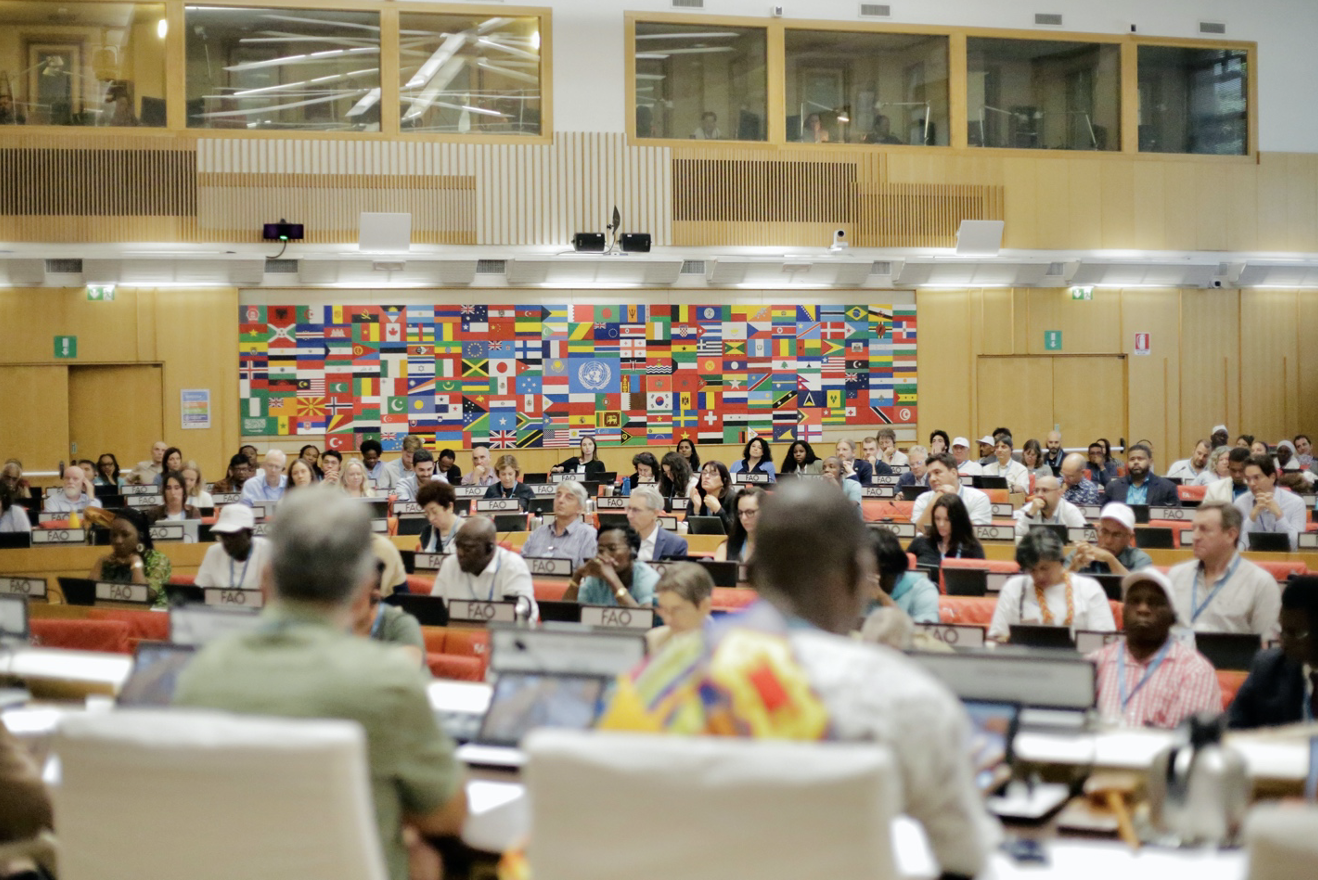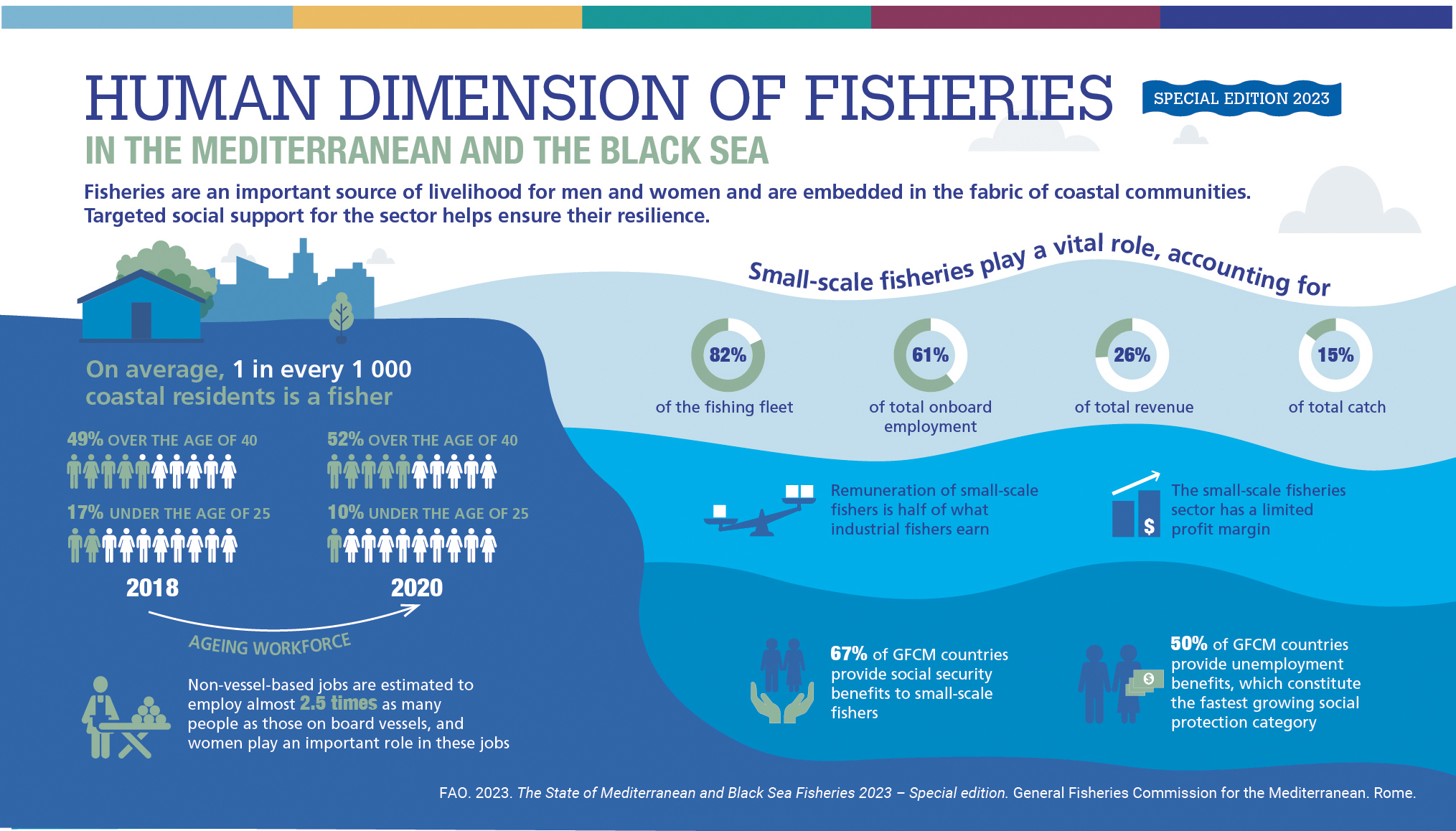Fishers and fisheries stakeholders gather to take stock of progress and shape the future of the of the small-scale fisheries sector in the Mediterranean and the Black Sea

Rome, Italy.
More than 50 small-scale fishers and small-scale fisheries stakeholders, together with representatives from relevant organizations, gathered in Rome to review progress in the implementation of the Regional Plan of Action for Small-Scale Fisheries in the Mediterranean and the Black Sea (RPOA-SSF) Regional Plan of Action for Small-Scale Fisheries in the Mediterranean and the Black Sea (RPOA-SSF) and reassess priorities towards reaching its objectives by 2028. The meeting marked the mid-term point in the implementation of the ten-year roadmap to address challenges and reinforce opportunities for the small-scale fisheries sector.
Highlighting the vital role of the small-scale fisheries sector
The health of small-scale fisheries (SSF) is critical to Mediterranean and Black Sea coastal communities, with SSF accounting for 82 percent of all vessels in this region so dependent on the sea and its resources. In fact, the sector provides as much as 61 percent of total onboard employment while relying on only 15 percent of the catch and producing 26 percent of the region’s fisheries revenue. This comes, however, at the cost of often slim profit margins, which, together with limited social protection benefits, create significant challenges for the sector. The need to preserve SSF by enhancing their resilience and supporting their long-term sustainability is the principle behind the RPOA-SSF, a ten-year roadmap towards the long-term environmental, economic and social sustainability of the sector, which was adopted in 2018 as a result of efforts from GFCM countries to raise awareness on the importance of SSF for the region.
Addressing progress since 2018
The RPOA-SSF mid-term event was organized by the General Fisheries Commission for the Mediterranean (GFCM) within the framework of the Small-scale fisheries Summit 2024 (SSF Summit 2024) and under the auspices of the Friends of SSF platform, particularly the WWF-Mediterranean Marine Initiative (WWF-MMI) and the Mediterranean Advisory Council (MEDAC). It built on the results of a recent assessment of RPOA-SSF implementation showing good progress with respect to SSF management, data collection, enhanced access to social protection, and engagement of stakeholders. This assessment also considered the outcomes of a high-level event on advancing the RPOA-SSF in the context of the GFCM 2030 Strategy, held in 2021, and GFCM Resolution GFCM/45/2022/3 on the implementation of the RPOA-SSF, adopted in 2022.
The event allowed SSF stakeholders from across the Mediterranean and Black Sea region, as well as representatives from the Directorate-General for Maritime Affairs and Fisheries of the European Commission (DG MARE), Aquatic Resources Malta and other relevant partner organizations, to express their views on the main priorities to be considered in the context of evolving institutional landscapes and a changing climate. It also offered the opportunity for representatives from RPOA-SSF signatory countries to engage in dialogue with the fishers present and share their vision for reaching the ambitious goals set for this fundamental sector.

Roundtable organized at the RPOA-SSF event with fisheries stakeholders and representatives of the European Commission (DG MARE), Aquatic Resources Malta and WWF North Africa © GFCM/Intissare Aamri
"We urgently need to encourage young people to join the SSF sector by improving its image, reducing bureaucracy, providing more meaningful social protection benefits and being more inclusive of fisher views in decision making. Without new entrants, the sector's future viability and sustainability are at risk," declared Benoît Guerin, a French fisher from Hyères. "Financial support is crucial for the effective functioning of SSF cooperatives and organizations and for tackling specific issues like climate change adaptation," added Can Görgün, President of the Akyaka cooperative in Türkiye.
Improving knowledge through capacity-building
The RPOA-SSF has spurred efforts at the regional level to engage stakeholders and to improve knowledge of the sector – for example, through regional programmes like the Small-Scale Fishers’ Forum (SSF Forum) and ad hoc studies and data collection initiatives – seeking to complement efforts underway at the national and local levels.
The SSF Forum, an initiative supporting the capacity development of SSF communities, bears witness to the progress achieved under the RPOA-SSF. Over the past four years, the active ownership and participation of more than 1 000 fishers and fisheries stakeholders exemplify successful implementation of capacity building and participatory approaches, both key topics among the nine pillars of the RPOA-SSF.
Channeling past experience into future success
Emphasizing and giving voice to the human dimension of SSF has long driven FAO and the GFCM’s work towards better livelihoods and more sustainable practices in the sector. The second edition of the SSF Summit, organized from 5–7 July 2024 by FAO, the GFCM, the IPC Working Group on Fisheries, the SSF Hub and SwedBio, represented a pivotal step in the transition from discussion to a true collective endeavour with a common objective: advancing the implementation of the Voluntary Guidelines for Securing Sustainable Small-Scale Fisheries in the Context of Food Security and Poverty Eradication (SSF Guidelines). Capitalizing on the lively and impactful discussions of the SSF Summit, the RPOA-SSF mid-term event focused the main themes and priorities of this global summit through the lens of the Mediterranean and Black Sea region.

The SSF Summit gathered more than 300 participants from 80 countries © GFCM/Intissare Aamri
Just as the takeaways from the SSF Summit aspire to provide key foundations for the decisions made at the FAO Committee on Fisheries (COFI) in July 2024, the RPOA-SSF mid-term event’s recommendations, together with the conclusions of the GFCM Working Group on Small-Scale Fisheries held in March 2024, lay the groundwork for deliberations by decision-makers that will take place at the annual session of the GFCM in November 2024.
The conclusions and recommendations of the RPOA-SSF mid-term event are available here.
The GFCM annual session will prove fundamental in driving a common vision – supported by fishers, experts and decision-makers alike – towards reaching the goals of the RPOA-SSF, while also informing the development of future political commitments for the SSF sector in the Mediterranean and Black Sea region.
“The views emerging from the RPOA-SSF mid-term event, highlighting important aspects such as considering fisheries actors' knowledge into advisory processes, fostering generational turnover, and addressing issues like overfishing and climate change adaptation, will equip the Commission with the essential information and resources needed to make informed decisions,” concluded Anna Carlson, Fisheries Officer (Livelihoods) for the GFCM. “This will facilitate the achievement of the RPOA-SSF objectives by 2028 and support the resilience and viability of the SSF sector.”
What is the Regional Plan of Action for Small-Scale Fisheries in the Mediterranean and the Black Sea?
The Regional Plan of Action for Small-Scale Fisheries in the Mediterranean and the Black Sea (RPOA-SSF) is a political commitment setting forth an ambitious ten-year roadmap for 2018–2028. It prescribes concrete and coherent measures to address challenges and reinforce opportunities for small-scale fisheries, including by incorporating views and knowledge from fishers in the discussions towards decisions that affect their livelihoods, ensuring the safeguarding of environmentally sustainable fishing practices and providing economic, social and employment benefits. The RPOA-SSF was signed as a Ministerial Declaration by high-level representatives on 26 September 2018 and now includes signatories from 19 Mediterranean and Black Sea countries, as well as the European Union. The RPOA-SSF was the first tailor-made regional plan of action based on the FAO SSF Guidelines. Hence it is a historic step for the region and a concrete commitment to ensuring the long-term environmental, economic and social sustainability for small-scale fisheries within the next decade.
Learn more
The 2nd edition of the #SSFSummit gathered over 300 participants to celebrate the #SSFGuidelines, discuss the future of #SmallScaleFisheries, & ensure their voices are heard.
— Fisheries & Aquaculture (@FAOfish) July 13, 2024
🙏 to: @SSFHub, @UN_FAO_GFCM, @IPCSovereignty, @SwedBio, @EU_MARE pic.twitter.com/nWcyRUePCs

